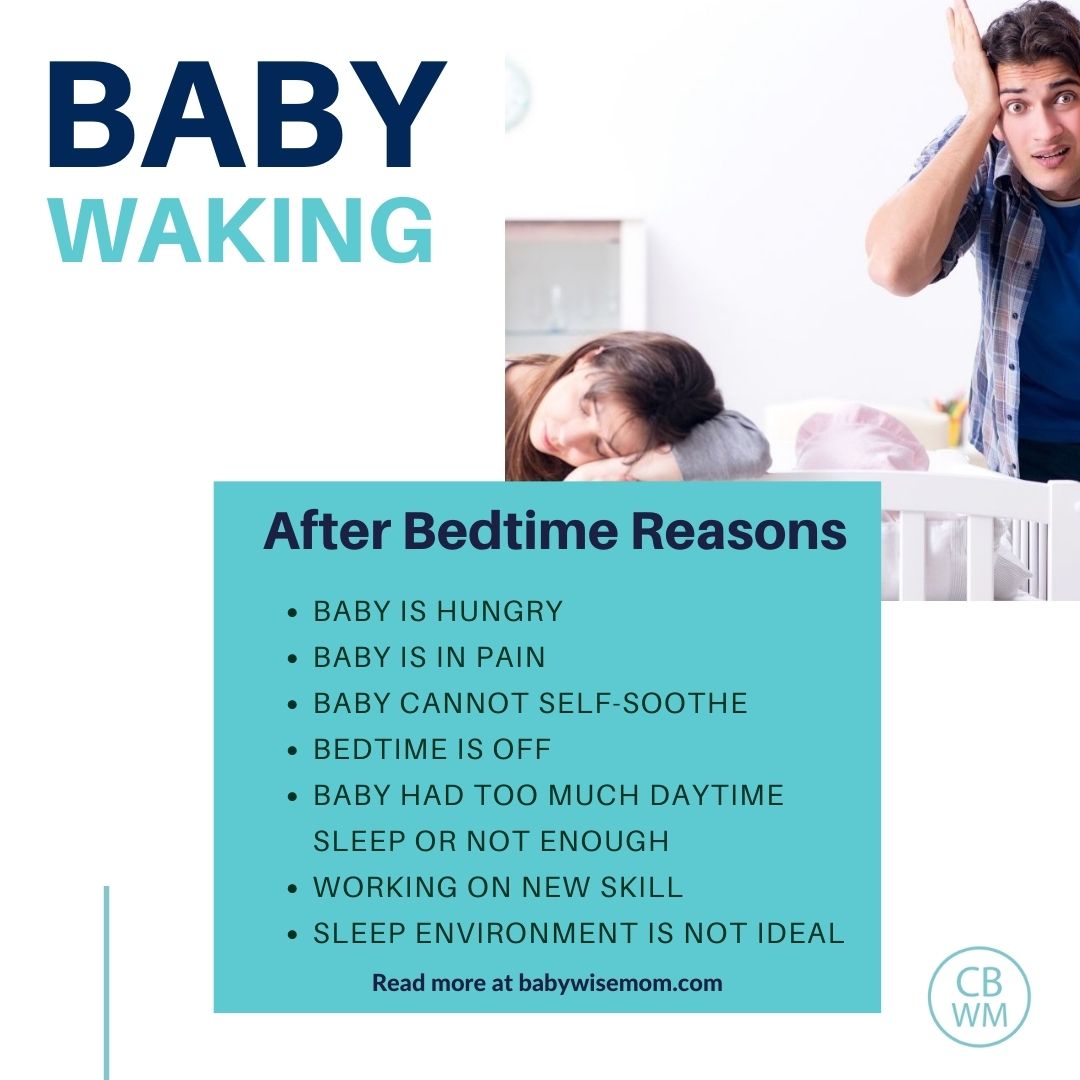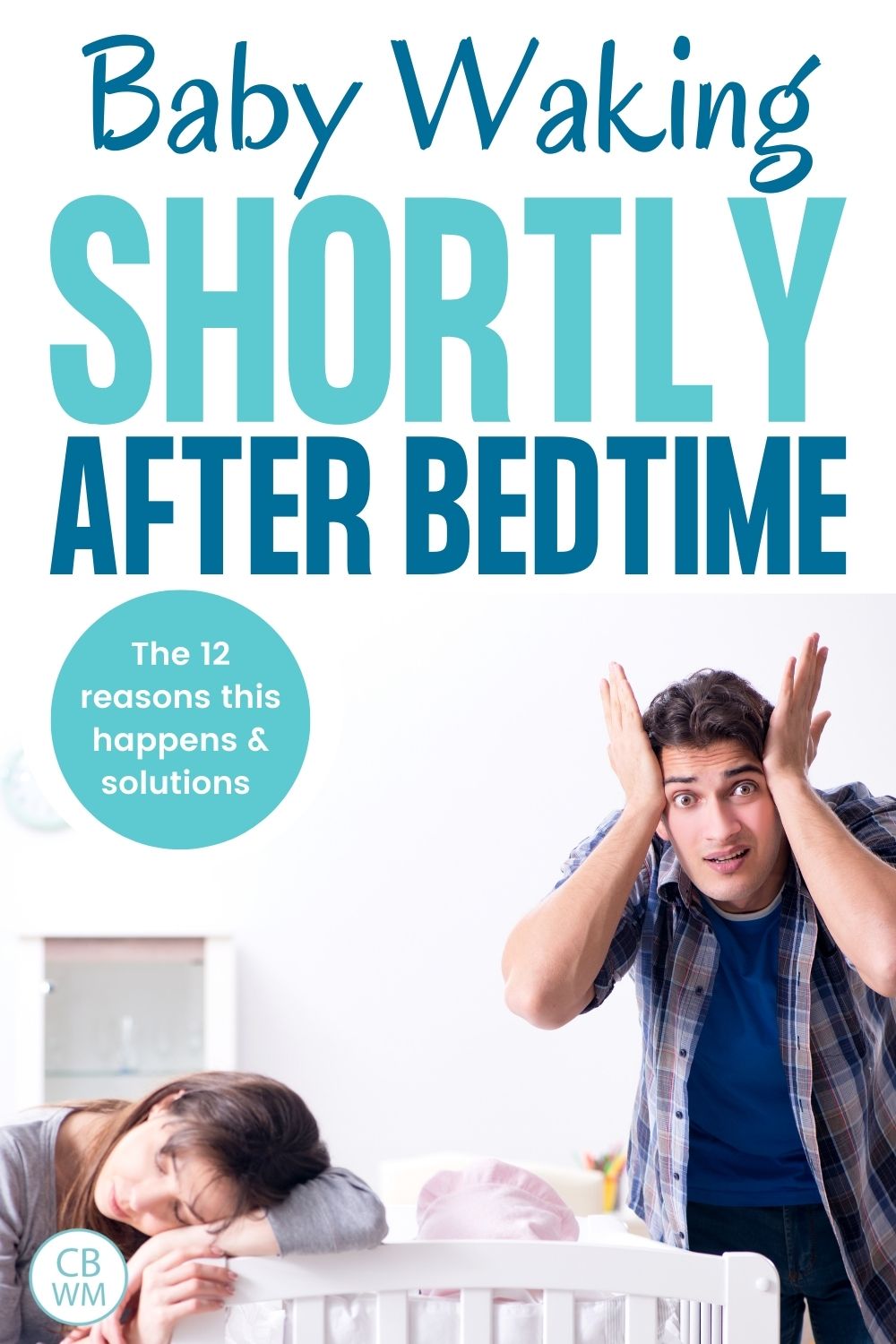Struggling with a baby who wakes shortly after going to bed? Discover the top 12 reasons for false starts, from hunger and teething to sleep regressions and overstimulation. Learn effective solutions to help your little one sleep soundly through the night.
There are few things as satisfying as getting your little sweetie in bed for the night. After a long day of caring for your little one, you can finally get some much-needed downtime.
It makes sense, then, that there is immense stress when your baby wakes shortly after going to bed for the night.
This is often called a false start, and can be incredibly emotionally draining for the parents.
There are many possible causes for this happening. In this post we will go over each cause and what to do about it.
Whenever you are trying to solve a sleep issue, you do not want to try to “fix” every possible cause at the same time. When you do that, you can fix the cause but end up creating another issue because you changed something that shouldn’t have been changed right now.
Identify the most likely cause and address that. If that doesn’t work, move on to the next solution. I know you want it fixed fast, but I promise this is the fastest way to do so.
I have listed these in the order I would typically recommend you go through to solve the issue, but always listen to your own intuition.
Baby is Hungry
I list hunger first for two reasons.
One is that if your baby is hungry, you want to feed your baby. You do not want to be worrying about how much daytime sleep baby is or isn’t getting when in reality she just needs more food.
The second reason is that if baby is hungry, the only thing that will fix your sleep problems is feeding baby. Nothing else will work.
This can be a fast fix. To test to see if baby is hungry, simply try to feed baby. See what happens. If she takes a full feeding, you can reasonably assume she was hungry.
>>>Read: How To Tell if Baby is Getting a Full Feeding
This can happen because baby is having a growth spurt. It can also happen if she needs more food during the day just in general.
Remember that growth spurts happen every 3-4 weeks. It is often! Typically, a growth spurt will disrupt the nap and not just night sleep.
>>>Read: Baby Growth Spurts: Everything You Need To Know
Your baby might not be having a growth spurt but does need another feeding in the 24 hour period. You can easily do this by adding in cluster feeding, a dreamfeed, or feeding more often during the day so you get another feeding in.
You can also try getting more ounces or food in per feeding. You want to increase daytime calories. You can do this by allowing baby to nurse beyond being done to increase milk supply if you are nursing (or you can pump to increase), add ounces to each bottle if bottle feeding, or add how much solid food baby is getting if baby is on solids.
Baby is in Pain
It is really hard to sleep if you are in pain. Pain is common when baby is teething. Even before teeth break through, the gums have a lot of pressure and can hurt a lot.
Pain can also come from gas or from a food allergy. Baby also might have reflux that causes pain.
You can even have simple things like baby’s footed pajamas being too tight and hurting the toes or a hair being wrapped around a finger or toe and cutting off circulation.
Your baby might also be in pain or discomfort because fo a sickness. It can be hard to sleep when you are sick.
No matter the reason for the pain, the way to solve baby waking from pain is to address it. Here are some posts:
Baby Cannot Self-Soothe
A very common reason for rough baby sleep is that baby cannot self-soothe. Any time a baby goes through a sleep transition (essentially moving in and out of REM sleep), baby comes to an awake state. This leads baby to potentially waking up.
This leads to short naps as well as waking shortly after going to bed for the night. It can also lead to middle of the night wake ups for no reason other than your infant needs your help to fall back asleep. Transitions happen through the night.
Also, if baby cannot self-soothe, sometimes he will lie in bed quietly for a while and then start to cry. So you will think he fell asleep but he didn’t really.
If your baby uses a pacifier, take note that while it can be a helpful tool for sleep, it can also be a sleep prop. You can tell this is the case if you have to frequently go back in the room to reinsert the pacifier in order for baby to sleep. It is very common for the pacifier to start to be a problem for sleep around 3-4 months old.
>>>Read: How Pacifiers Might Be Ruining Your Baby’s Sleep
The way to solve these wakings is through sleep training baby. It doesn’t matter HOW you sleep train your baby. There are a lot of sleep training methods. I will link some options for you to consider:
Bedtime is Off
If bedtime is off, baby will have a hard time settling in and falling asleep.
When I say bedtime is off, I mean bedtime is too early, bedtime is too late, or the bedtime routine is rushed.
Sleep routines are vital to having solid, consistent sleep. If you do not have a predictable sleep routine your baby can rely on, create one now.
>>>Read: Sleep Routine Ideas to Get Your Baby Sleeping Well and Perfecting Your Babywise Bedtime Routine
You also need to make sure bedtime is happening at the right time and that it is at a consistent time from day to day.
You might be avoiding an early bedtime because you worry baby will not sleep as well as she would if she goes to bed later, but babies actually need to go to bed quite early.
Bedtime for most babies will happen sometime between 7-8 PM, but that does depend on what time baby wakes up each morning. Aim for bedtime to be about 12 hour before baby wakes in the morning (or before you want him to wake). Read Tips for Finding Your Child’s Ideal Bedtime for more guidance.
Baby Has Too Much Daytime Sleep
For older babies, there can come a point when you have too much daytime sleep for bedtime to go smoothly.
If your baby has been great after bedtime previously, but has started waking up, consider that it might be time to drop or shorten a nap.
You typically drop from 4 to 3 naps around 4 months old. Baby typically drops to 2 naps a day between 6-10 months old. Your toddler will drop to one nap a day between 14-22 months old.
You can either drop a nap or shorten a nap to get less sleep in the daytime and make sure your baby has enough sleep pressure built up for night sleep..
>>>Read: Dropping Naps: A Quick Reference
Baby Does Not Have Enough Daytime Sleep
If your baby has the correct number of naps for her age but they are shorter than ideal, she might be having a hard time falling asleep at bedtime because she does not have enough daytime sleep.
If this is the case, you want to work on fixing those shot naps. Naps should be 1.5-2.5 hours each, with the exception of the last nap of the day if you have 3 naps or more being only 30-60 minutes long.
If this is your baby’s issue, you want to work on fixing naps so he gets enough sleep. A vital part of that equation is having proper awake time.
>>>Read: Complete Guide to Troubleshooting Short Baby Naps
Baby is Working on New Skills
Almost all babies have a point when new skills disrupt sleep. This can affect naps or night sleep or both.
Babies get really excited when they are learning something new and will often want to work on it even when in the crib. So the baby who is just crawling or babbling might want to practice that new skill at every opportunity, even if it is time to sleep.
This is so common that I have an entire post dedicated to it, so see How to Stop New Skills from Disrupting Naps and Sleep for help on fixing this. Developmental milestones are exciting, but they do often disrupt sleep.
The Sleep Environment is Not Ideal
Your baby’s nursery needs to be set up for successful sleep.
You do not want it to be too noisy. This can be hard if you have a bustling home or have older kids. If noise is an issue, that can be easily fixed with a white noise machine.
Baby will have a hard time sleeping if she is too hot or cold. This can be fixed with pajamas or room temperature.
If the sun is still up when you are putting baby to bed, this might be preventing him from falling asleep at night or from staying asleep through the sleep cycle.
The sun is vital in establishing a circadian rhythm. If the sun is still up when your baby goes to bed and there is light in the room, melatonin will not be released. Consider blackout curtains to help with this.
Even smells can wake a baby up. Consider all of the senses.
Baby is Having a Sleep Regression
Sleep regressions are real and can really disrupt sleep. This can be pretty easy to guess if it is the cause of baby waking shortly after going to bed. Look at common ages for sleep regressions and see if your baby is in that age range.
If you have a 4 month old baby who suddenly started having sleep issues, it is likely a sleep regression. The 4 month sleep regression is notorious for disrupting sleep.
There are other ages for regressions. Read more in Sleep Regressions: Causes, Ages, and What to Do.
As you consider a sleep regression, think about witching hour, also. Witching hour is common with newborns and will disrupt newborn sleep in the evenings. During this time, your baby will basically not sleep. If your baby is a great sleeper all day and seems to be a different person sometime in the early and/or late evening, witching hour is a strong possibility.
>>>Read: How To Manage Baby’s Dreaded Witching Hour
Baby is Overstimulated
Almost everything is new to a baby. As our baby grows, she is able to pay attention to more and take more in. All of the sights, sounds, smells, and activity of the day adds up. Overstimulation leads to frequent wakings.
An overstimulated baby will not sleep well. This will not typically be the issue every single day unless you are basically never home or if baby does not get enough daytime sleep. If your baby has chronic short naps, then overstimulation can easily be your issue.
Respect what your baby can and cannot handle. As your baby gets older, she will be able to deal with more stimulation. Right now, do not do more than she can experience without tears–at least not regularly.
Overstimulation at bedtime can also happen if the last wake window is too long. Do not keep baby up longer than is ideal for her wake windows in hopes she will sleep better for nighttime sleep. That always backfires. Too much awake time is not a good thing. Overtiredness leads to frequent wakings.
Baby is Understimulated
Conversely, if baby has not had enough stimulation, sleep will not be solid. When we sleep, the brain works through what was learned that day. You get tired when you have things to work through.
If you think your baby is understimulated, you simply need to add wake time and/or add activity to your child’s day. Even just new toys can be enough to help with this. Stimulation comes in many forms, so think about mental stimulation as well as physical stimulation.
Baby has Nightmares
While this isn’t a common cause for baby waking shortly after going to sleep, it is worth thinking about. I am listing it last because nightmares typically happen in the middle of the night, not shortly after falling asleep. Night terrors happen shortly after falling asleep but are not common until 3 or older.

Conclusion
There you have 12 possible reasons your baby is waking up shortly after going to bed. This would be baby waking up within the first hour, so 20 minutes after bedtime, 30 minutes after bedtime, etc.
Work through this list to find your solution. Good luck and feel free to ask questions in the comments below.
Related Posts

This post first appeared on this blog in July of 2022


